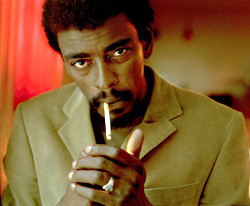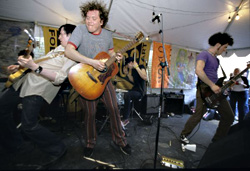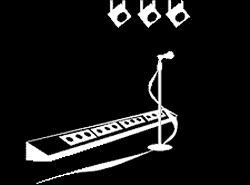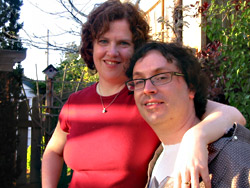They call him Mister Jorge. That’s how Seu Jorge’s adopted name translates from Portuguese, and he’s earned the honorific. In a widely told story, Jorge Mario da Silva received his first guitar as a gift while growing up in the favelas—slums—of his native Rio. After a slow rise for Jorge as a musician and actor, U.S. hipster love for all things Brazilian has dovetailed with Jorge’s rising profile as a key artist in samba’s revival as a progressive genre.
Aligning himself with street-level favorites such as João Nogueira and Zeca Pagodinho (the “king” of the favelas, Jorge notes in an e-mail interview) more so than with Caetano Veloso and Gilberto Gil (“relevant,” he acknowledges, but more beloved of the intelligentsia), he first recorded in the mid-’90s with Farofa Carioca, an eclectic band that drew on everything from samba to hip-hop. Describing them now, Jorge focuses as much on their “very theatrical, with jugglers and acrobats on the stage,” act as on their music.
“When I left this band,” says Jorge. “I decided to create a style of music that was raw (hence the name of my album, Cru). This means that you get what you see; there are no illusions [or] theatrics, just me playing.”
Cru tones down the slightly overbearing bass and busy textures of 1999’s Mario Caldato–produced Samba Esporte Fino for an airier but no less rhythmically commanding sound. Harking back to the less avant sides of Veloso, Gil, and Vinicius Cantuária, the record cunningly splits between an upbeat first half and a dreamier second. The former includes a much-celebrated put-down of breast implants, “Mania de Peitão” (“Large-Chested Mania”), while the latter kicks off with a smart cross-cultural gambit, a soft-spoken move on Elvis Presley’s slow-grinding “Don’t.”
That’s not his first notable cover, of course. Jorge’s résumé as an actor, which stretches back to early-’90s Brazilian stages, has led to a second career as a minor film star in the grittily urban City of God and Wes Anderson’s domestic drama-cum-adventure flick The Life Aquatic With Steve Zissou. It was the latter’s transformations of David Bowie numbers into soft meditations that alerted U.S. audiences to his musical chops. Surprisingly, Jorge was barely familiar with the art-rocker’s work before finding his way into the intimate renditions. Mixing and matching English phrases (a grumbled “Rock and Roll Suicide”) with his own liberal translations (the new “Changes” was inspired by Jorge’s long haul out of the ghetto), they added up to a startling new work that went far beyond the novelty-coffeehouse realm. The film’s success eventually led to the release of Bowie covers that hadn’t made the soundtrack album’s final cut.
Jorge’s claim on the songs reflected a kinship with Bowie’s own peripatetic nature.
“Bowie very rarely grants the rights for you to change his songs,” he says, “but I think he was open-minded, and when he heard them, he liked what he heard.”
Even without an English lyric sheet, the same ruefulness occasionally bleeds through Cru. “Eu Sou Favela” (“I Am Favela”), announces the final song, but overall Jorge is proud to make his claim as a musical showman. “I just love performing, I love to entertain. If the audience loves me, then I have done my job. The best thing also in touring America is now it is starting to become familiar and I am feeling more at home; also it means that you are starting to like me.”
It may well be a cheerfulness born of relief, though informed by bitterness: Jorge’s younger brother was killed at 16 by the Rio police. Jorge says that even the harsh City of God didn’t fully reflect the toughness of favela life. “I think it is much more violent than it was portrayed. I think to make a movie of the true reality would be too distressing. At night you could not sleep on the streets for fear of being set alight by gangs. They did this just for the fun of it. Once you are involved within the favelas, it is very difficult to get out of it; and if you do it is very difficult not to go back, because it just gets under your skin.”
Jorge recognizes the eloquence of his City character, Knockout Ned, but also managed to steer clear of a gangster’s fate. “It is very easy like Knockout Ned to get involved in the undercurrents of the favelas and the evil side. My family taught me very clearly right and wrong, and we kept strong; [and] even during the worst times, I did not get involved with the gang warfare and drugs that a lot of people do.”
Jorge doesn’t brag, or even seem to be speaking with pride. The ultimate payoff, perhaps, is enough.








